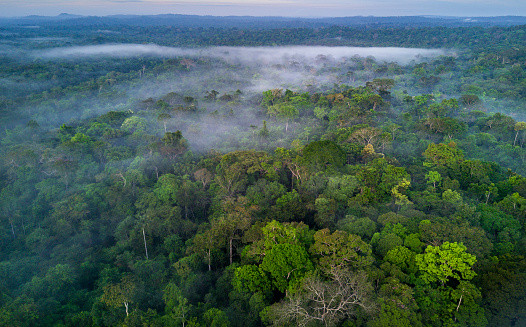
In 2019, Jair Bolsonaro took office as the president of Brazil, a four-year tenure that has been termed destructive for the Amazon.
Now, new research has found that carbon emissions in the Amazon rainforest almost doubled in 2019 and 2020, compared to the previous decade, due to "changes in law enforcement of environmental protection policies."
During Bolsonaro's presidency, large parts of the Amazon rainforest were cut down to create space for digging up minerals, raising cattle, and growing soybeans, etc., which in turn led to the loss of almost two million hectares of forest cover, the Guardian reported.
This rapid deforestation led to the doubling of the rainforest's carbon emissions in 2019 and 2020--a warning ecological shift that underscores the urgent need for conservation efforts to preserve the ecosystem.
The current state of the Amazon rainforest, renowned for its pivotal role as a vital carbon sink and climate regulator, has now taken a deeply concerning turn. This situation is particularly alarming, as researchers warn the rainforest has reached a critical "tipping point" concerning carbon emissions.
The recent study published in the journal Nature has caught the attention of environmental experts, as it showed that despite Amazon's reputation for soaking up carbon dioxide through its trees, it is now emitting more carbon than it absorbs.
Experts from Brazil's national space agency, INPE, which was known for spotting environmental shifts, made the surprising discovery about the Amazon rainforest.
This could lead to serious consequences for the planet's climate at large, the agency warned, according to RTE.
The Brazilian Amazon suffered rampant deforestation from 2019 to 2020, with figures shooting up by a whopping 80% compared to the years between 2010 and 2018. There was a 14% increase in burned areas across the Amazon basin in 2019, which jumped to 42% in the next year, stirring concerns about further biodiversity loss and increased carbon emissions.
Carbon emissions saw a significant increase from the annual average of 0.24 gigatonnes from 2010-18 to 0.44GtC in 2019 and 0.55GtC in 2020.
Bolsorano's notable lack of effective environmental policing contributed to the increased cutting of trees, forest fires, and illegal activities in Brazil's protected areas and indigenous territories. This lax approach to enforcement has invigorated activities harmful to the environment and indigenous communities, further augmenting the environmental challenges facing the country, which soon intensified the nation's environmental struggles.
Experts fear if the deforestation continues, the crucial rainforest stands the possibility of turning into a Savannah-like landscape.
Fortunately, since assuming office in January, Brazil's new president Luiz Inacio Lula da Silva has delivered an impressive 42.5% reduction in deforestation across the Brazilian Amazon till July.
However, the true challenge emerges as the Amazon faces the onset of drier weather, which coincides with its peak deforestation season. Amazon generally absorbs more carbon during wet years and less during dry weather.
© 2025 Latin Times. All rights reserved. Do not reproduce without permission.





